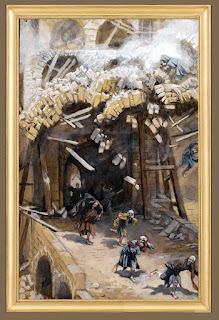May 1 Thu
Why did God choose Saint Joseph, a worker?
Saint Joseph was a good worker. With admirable simplicity, an ancient document from the early Christian era shows that Christians need to work. “If anyone wishes to live amongst you, let him have a job; let him work and thus feed himself. And if he has no job, make provision for him with prudence so that no lazy Christian is in your midst. If he does not want to act in this way, he is a trafficker in Christ. Be on your guard against such people."
A Christian should not be content with keeping himself busy all day long with different activities. He must sanctify everything he does. “If we want to live this way, sanctifying our profession or job, we really must work well, with human and supernatural intensity." This means using our time well, dedicating whatever time may be necessary, and putting to the best use the tools which God has placed in our hands.
The life of Saint Joseph was not spent amongst miracles, but in hard and steady work. “Saint Joseph was not one for easy solutions and little miracles, but a man of perseverance, effort, and, when needed, ingenuity. The Christian knows that God works miracles, that He did them centuries ago, and that He continues doing them now, because 'the Lord's hand is not shortened'. But miracles are a sign of the saving power of God, not a cure for incompetence nor an easy way to dodge effort."
“The 'miracle' which God asks of you is to persevere in your Christian and divine vocation, sanctifying each day's work: the miracle of turning the prose of each day into heroic verse by the love you put into your ordinary work. God waits for you there. He expects you to be a responsible person, with the zeal of an apostle and the competence of a good worker."
Serious work goes united to prayer – Saint Joseph knew how to listen to God, and to talk to Him. He had Him, as a Man, right there, at home, in the workshop. This is prayer.
Prayer is the lifting up of the heart and mind to God. In every moment of our day, we must follow the path of love, desiring the good of the other. God is love and that is all He is.
“Every day we should set aside time especially for speaking with God, but without forgetting that our prayer must be constant, like the beating of our heart: aspirations, acts of love, acts of thanksgiving, acts of reparation, spiritual communions. When we walk along the street, when we close or open a door, when we see a church bell-tower in the distance, when we begin and end our tasks, and while we are carrying them out, we direct everything to God. We are obliged to make a continual prayer of our ordinary life, for we are contemplative souls along all the pathways of the world.” (Saint Josemaría)
Thank you, Father, for conferring on me the passion and courage with which I must fulfill your will. I humbly beseech You to increase my faith and my hope.
Lord, I ask that I may not reject your Love, that I may always be close to You as the little hatchlings to the hen. May my freedom be always to choose You.
When someone goes that way, the Blessed Trinity transforms the soul in which it dwells, imprinting signs of its presence on it, making it more and more like Itself.


























